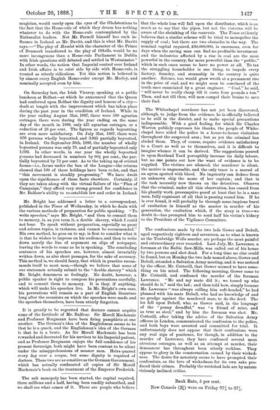Mr. Bright has addressed a letter to a correspondent, published
in the Times of Wednesday, in which he deals with the various methods of preparation for public speaking. "To write speeches," says Mr. Bright, "and then to commit them to memory, is, as you term it, a double slavery, which I could not bear. To speak without preparation, especially on great and solemn topics, is rashness, and cannot be recommended." His own method, he goes on to say, in first to consider what it is that he wishes to impress on his audience, and then to write down merely the line of argument on slips of notepaper, leaving the words to come as he is speaking. The concluding sentences of his speeches are, however, almest invariably written down, as also short passages, for the sake of accuracy. 'This method is, we should fancy, that which in practice recom- mends itself to most men,—though we believe that some of our statesmen actually submit to the "double slavery" which Mr. Bright denounces so feelingly. No doubt, however, a public speaker is right to compose his perorations carefully, and to commit them to memory. It is they, if anything, which will make his speeches live. In Mr. Bright's ewn case, his perorations will remain as a part of English literature long after the occasions on which the speeches were made, and the speeches themselves, have been utterly forgotten.


































 Previous page
Previous page